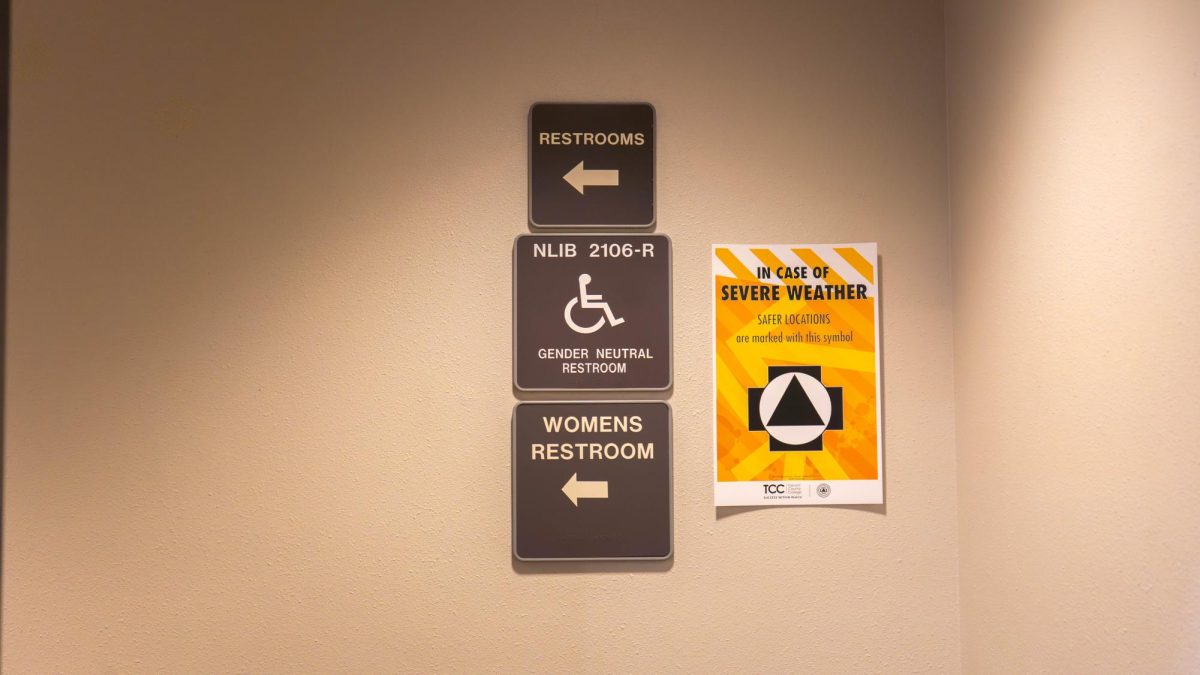
DIEGO SANTOS
Gender Neutral Restroom in NE library restroom.
TCC is putting together a legislative response team to look at the impact of a new state law requiring transgender people to use on-campus bathrooms that match their assigned sex at birth.
Senate Bill 8, also called the Texas Women’s Privacy Act, places these restrictions on bathrooms at public institutions and government-owned buildings. The restrictions will not apply to gender-neutral bathrooms and will only affect multi-occupancy bathrooms.
The bill, which goes into effect Dec. 4, places a fine of up to $125,000 on the institution if they violate the law.
Gov. Greg Abbott posted a video on X of him signing the bill Sept. 22. He said the bill will keep men out of women’s restrooms.
“This is just common sense,” he said.
TCC General Counsel Antonio Allen said he is in the early stages of forming a legislative response team that includes him and Vice Chancellor for Communications and External Affairs Reginald Gates. He said the district is dedicated to both following the law and giving transgender students alternatives.
According to the Movement Advancement Project, Texas is the seventh state to restrict transgender people’s access to bathrooms in all government buildings, joining Montana, Wyoming, Utah, Florida, South Dakota and Arkansas.
Some students are concerned about the effects the bill would have on transgender individuals living in Texas.
SE student Austin Barfield, a transgender man and a member of the Gay-Straight Alliance, said the fear of having transgender people in bathrooms is unfounded.
“It’s a perpetuated fantasy that comes from lack of education and bias,” he said. “It’s quite ignorant to insinuate what’s being said or what might happen.”
Barfield said these kinds of bills are made to target transgender people.
“Since trans people make such a little percentage of the population, I always find it silly that there’s always these huge laws going into place that primarily affect us,” he said.
According to a 2022 Williams Institute study, only 0.43% of all adults in Texas identified as transgender, which is slightly lower than the national average of 0.52%.
The American Civil Liberties Union of Texas released a statement on the day of the bill’s passing. Ash Hall, the policy and advocacy strategist on LGBTQIA+ rights at the ACLU of Texas, said the bill is unconstitutional.
“This law puts anyone at risk who doesn’t seem masculine or feminine enough to a random stranger, including the cisgender girls and women this bill purports to protect,” they said. “Some people might forgo using public restrooms entirely out of fear for their safety, even if it endangers their health.”
Barfield said the bill would have a significant impact on transgender individuals who have been on hormones for years and physically pass as the gender they are transitioning to. A transgender man who passes as a man, for example, could be making cisgender women and girls uncomfortable in the women’s bathroom.
“Obviously, this grown man, this [transgender] man, does not belong in that restroom or that setting,” he said. “I think it’s also like to protect one group you’re harming another.”
SE student Leslie Zacarias, who is also in the GSA Club, said the bill puts the penalty on the institution instead of the individual in violation of the law because they are afraid of any cuts in funding from the government as punishment.
“Ultimately, those are the people that give, especially community colleges, most of their funding,” Zacarias said. “The last thing they want is for money to be taken away from the school. … So they try to stay in line with compliance. We saw it with the DEI and we’re probably going to see it again.”
Some of Barfield’s transgender friends have left Texas for a blue state out of fear. Barfield said he hopes the pattern doesn’t continue and that there can be change.
“I don’t think trans people should ever feel the need to leave their home because they’re worried about laws that are targeting them,” he said.